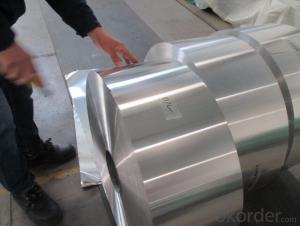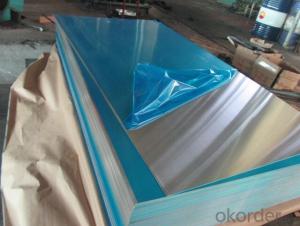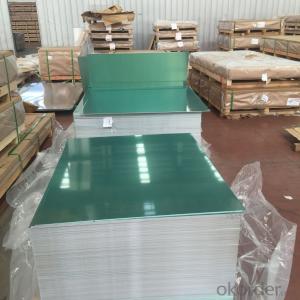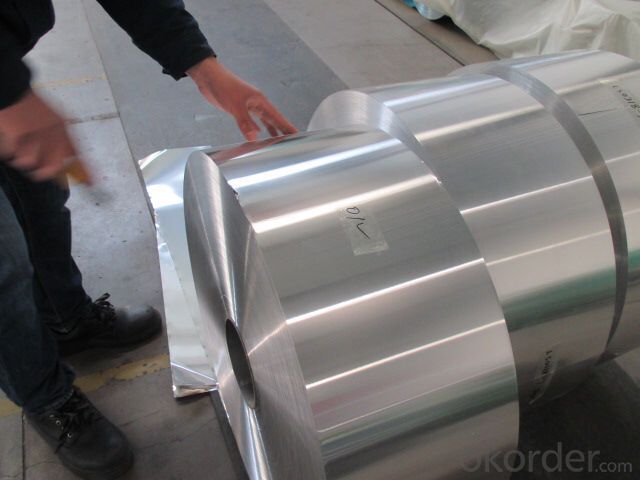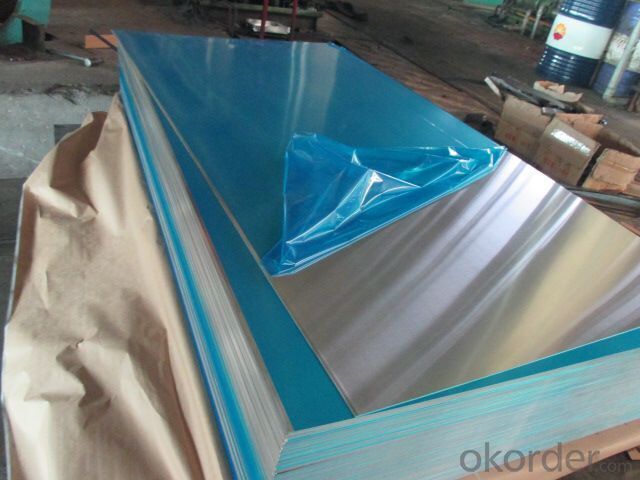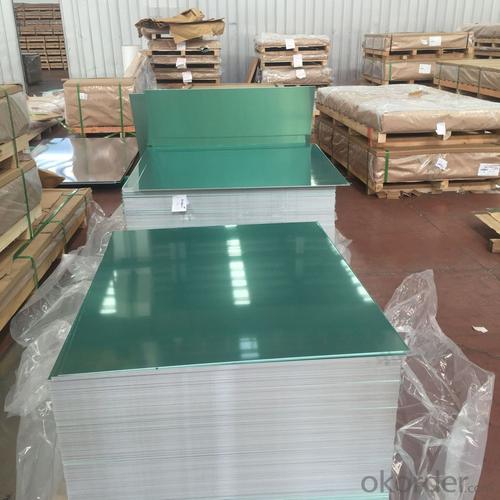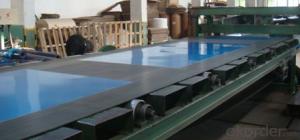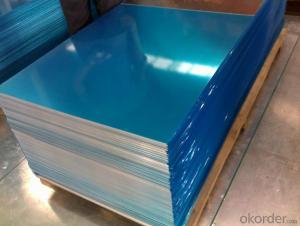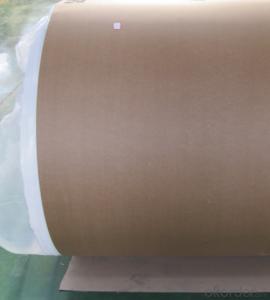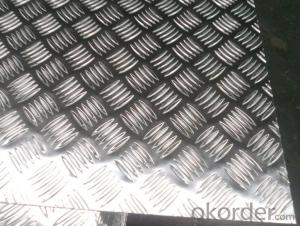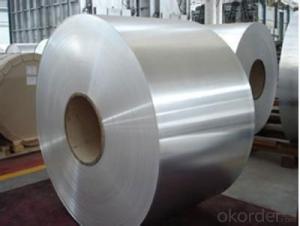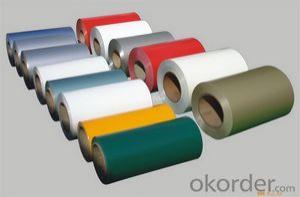Aluminum Sheets - Coated Aluminium Coil AA3150-H16, 0.92mm Thickness
- Loading Port:
- Shanghai
- Payment Terms:
- TT OR LC
- Min Order Qty:
- 5 m.t.
- Supply Capability:
- 5000000 m.t./month
OKorder Service Pledge
OKorder Financial Service
You Might Also Like
Specification
AA1050 C.C Mill Finished Aluminum Circles used for Cookware is widly used in building, industry ect. Its weight is much lower than steel. So many customers choosed aluminium material instead of steel.
AA1050 C.C Mill Finished Aluminum Circles used for Cookware is one semi-finished aluminium material. This strip can be rolled down to aluminium foil.The final thickess can be 5-20 microns. Aluminium foil is soft, ductile and with a silver-white luster which can be widely used in a large scare of fields.
Characteristic:
1)Excellent weather-proof durability
2)Anti-ultraviolet
3)High erosion resistance
4)Stable color and gloss
5)Good mechanical processing performance
6)Abrasion resistance
7)Anti-impact
8)High flexibility
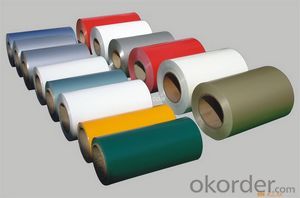
- Q: 1 ton of aluminium=______ tons of Alumina
- After analyzing the solutions I felt i'd desire to describe a sprint extra what others have not mentioned. constantly examine what the producer prints out on the label the two interior the door jam or glove container as to the finished available weight the truck can carry. Payload (weight it could carry) and towing potential (weight it could tow) are 2 a number of issues. additionally, maximum one ton vehicles can carry extra beneficial than a ton. as an occasion: If the vehicles GVWR gross motor vehicle weight score is 12000 lbs. and the truck weighs 7000 lbs, then you rather can haul 5000 lbs. this is human beings, gas, shipment, each thing. keep in mind, this is the optimal. GCWR Gross blended weight score is that of the truck and towing motor vehicle. If as an occasion this is 15000 lbs, and your truck weighs 7000lbs. then you rather are turning out to be an empty truck and tow as much as 8000 lbs. on the lighter edge, a million/2 ton %. united statesgeneraly are purely that--one thousand to 1900 lbs. 3/4 ton are a sprint extra and would have a camper kit as nicely. One plenty are stable for flatbeds, and the terminology is purely that--a generalization. stable success, and look for the placard.
- Q: need help choosing an aluminum welder at a descent price also
- It all depends on what you are doing. For light duty stuff 1/8 to 1/4 inch a spool gun will be the cheapest option. For intricate work tig. For production a push pull unit with a pulse arc but these are big $.
- Q: Are there any specific storage requirements for 101 aluminum sheets?
- Yes, there are specific storage requirements for 101 aluminum sheets. It is important to store them in a dry, clean, and well-ventilated area to prevent any moisture damage or contamination. Additionally, they should be stored in a horizontal position to avoid warping or bending.
- Q: What are the different grades of aluminum sheets available?
- There are several different grades of aluminum sheets available, including 1100, 3003, 5052, and 6061. These grades vary in terms of their composition, strength, and intended use. 1100 aluminum is the most commercially pure grade and is often used for general purpose applications. 3003 aluminum is alloyed with manganese and has improved strength and corrosion resistance. 5052 aluminum is alloyed with magnesium and has excellent weldability and formability. 6061 aluminum is alloyed with magnesium and silicon and is known for its high strength and versatility.
- Q: This question asks for the various types of surface treatments or coatings that can be applied to aluminum profiles to enhance their properties or appearance.
- <p>Aluminum profiles can be coated with several types of finishes to improve their aesthetic appeal, durability, and corrosion resistance. The common types include: 1) Anodizing, which creates a protective oxide layer on the aluminum surface; 2) Powder coating, where a dry powder is electrostatically applied and then cured under heat; 3) Electrophoretic coating, a method where charged particles adhere to the aluminum and then harden; 4) PVDF (Polyvinylidene Fluoride) coating, known for its excellent weather resistance and durability; 5) Thermal spraying, where a coating material is melted and sprayed onto the aluminum surface; and 6) Painting, which can be done through various methods such as airless spray or dip coating. Each type of coating serves different purposes and has its own set of advantages and applications.</p>
- Q: What is the atomic mass of aluminum?
- The atomic mass of aluminum is approximately 26.98 atomic mass units.
- Q: Aluminum plate thickness 3 mm, what is the allowable error in the national standard thickness?
- The allowable deviation of plate thickness in GB/T3880.3-2006 "general industrial aluminum plate, strip and Aluminum Alloy third part:" size deviation provisions, I have the standard download URL sent to you a message, please check.The deviation is divided into ordinary and high level, +0.10, -0.12
- Q: Can aluminum sheets be stamped or pressed?
- Certainly, one can stamp or press aluminum sheets. Aluminum, being an extremely malleable metal, lends itself readily to shaping and forming via diverse manufacturing methods. Stamping and pressing are frequently employed techniques for fashioning elaborate designs, shapes, and patterns onto aluminum sheets. These procedures entail the exertion of pressure upon the sheet by means of specialized equipment, such as stamping presses or hydraulic presses, with the aim of altering the material and achieving the desired form. Industries such as automotive, aerospace, construction, and manufacturing extensively rely on stamping and pressing, as aluminum sheets are commonly chosen for their lightweight, durable, and corrosion-resistant attributes.
- Q: Can aluminum sheets be anodized?
- Aluminum sheets are capable of undergoing anodization, which is an electrochemical procedure responsible for generating a safeguarding oxide layer on the aluminum's surface. This particular layer amplifies the metal's resistance against corrosion, its endurance, and its overall appeal. Anodization is widely utilized in various industries, such as automotive, aerospace, and construction, in order to furnish aluminum sheets with a defensive coating and enhance their visual aesthetics. The process entails submerging the aluminum sheet into an acidic electrolyte solution and subsequently passing an electric current through it. As a result, oxygen ions merge with the aluminum atoms and construct the oxide layer. This layer can be further augmented by incorporating dyes or pigments, resulting in diverse colors and finishes. All in all, anodization proves to be an adaptable and efficient technique for treating aluminum sheets.
- Q: Can aluminum sheet be used for electrical grounding applications?
- Indeed, aluminum sheet finds utility in electrical grounding applications. It possesses remarkable conductive properties, rendering it apt for employment in grounding systems. Its low resistance and exceptional electrical conductivity make it a common choice in diverse electrical applications. With the capability to proficiently transport electrical current and securely disperse it into the ground, aluminum sheet guarantees the safeguarding of electrical systems and averts potential electrical dangers. Moreover, the lightweight and corrosion-resistant attributes of aluminum establish it as a favored option for grounding applications across numerous industries, encompassing construction, automotive, and aerospace.
Send your message to us
Aluminum Sheets - Coated Aluminium Coil AA3150-H16, 0.92mm Thickness
- Loading Port:
- Shanghai
- Payment Terms:
- TT OR LC
- Min Order Qty:
- 5 m.t.
- Supply Capability:
- 5000000 m.t./month
OKorder Service Pledge
OKorder Financial Service
Similar products
Hot products
Hot Searches
Related keywords
